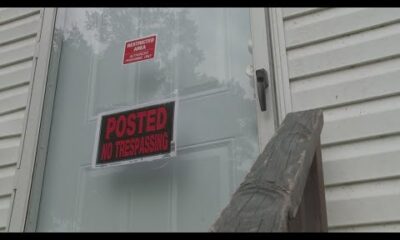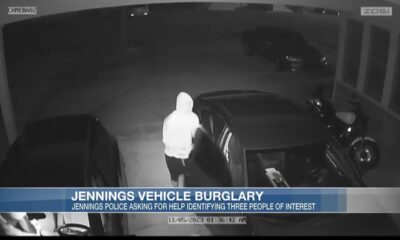Louisiana Illuminator
Juvenile court records could go public in Louisiana despite privacy, revenge concerns
Juvenile court records could go public in Louisiana despite privacy, revenge concerns
by Greg LaRose, Louisiana Illuminator
February 23, 2024
A proposal to provide public access to court records for juveniles accused of violent crimes advanced Friday from the Louisiana House of Representatives, despite concerns it could create permanent stigma for someone found not guilty.
House Bill 1, which would create the Truth and Transparency in the Louisiana Criminal Justice System Program, was approved in a 72-30 vote along party lines with Republicans prevailing.
Opponents also raised the possibility that victims and their families could use information from the records for retaliation if the bill becomes law.
Its sponsor, Rep. Tony Bacala, R-Prairieville, argued his proposal is necessary because prosecutors routinely fail to keep victims apprised of juvenile court proceedings. His legislation creates and funds an online database parish clerks of court would establish where qualifying juvenile records could be accessed.
“We hear from victims left in the dark. Even when they make a call, they can't get the information,” Bacala said.
House Bill 1 doesn't lift any restrictions on juvenile court records that currently aren't available to the public, Bacala said.
See how other states handle juvenile court records.
Reps. Alonzo Knox, D-New Orleans, and Edmond Jordan, D-Baton Rouge, respectively offered amendments to shield records once charges for violent crimes are downgraded to nonviolent and remove files if a suspect is found innocent. They agreed to withdraw the changes after Bacala said he would consider their specifics for possible addition when his bill is in the Senate.
Bacala did amend his bill before House floor debate began, removing its application to juveniles with multiple felonies.
Rep. Mandie Landry, D-New Orleans, suggested the Legislature act to hold district attorneys accountable for not keeping survivors and families advised during juvenile court proceedings. Bacala said it would be challenging to find a uniform or effective punitive measure for prosecutors found to be lacking.
Gov. Jeff Landry, when he was attorney general last year, supported a similar measure that lifted confidentiality from juvenile court records in Caddo, East Baton Rouge and Orleans parishes. It failed to gain approval.
House Bill 1 would apply to all 64 parishes.
Louisiana Illuminator is part of States Newsroom, a nonprofit news network supported by grants and a coalition of donors as a 501c(3) public charity. Louisiana Illuminator maintains editorial independence. Contact Editor Greg LaRose for questions: info@lailluminator.com. Follow Louisiana Illuminator on Facebook and Twitter.
The post Juvenile court records could go public in Louisiana despite privacy, revenge concerns appeared first on lailluminator.com
Louisiana Illuminator
Gambling on a constitutional convention • Louisiana Illuminator
by Robert Collins, Louisiana Illuminator
May 16, 2024
Louisiana Gov. Jeff Landry recently requested that the Legislature call a constitutional convention. He says the current constitution is too restrictive, and forbids cuts to most agencies, resulting in most cuts falling on higher education and healthcare. He also says that most of the amendments in the constitution should be statutes that can be changed by the state Legislature.
The enabling legislation that made it out of the House proposes to hold a two-week convention starting Aug.1, with convention committees meeting prior to the convention to receive public comments.
The current Louisiana constitution is a flawed and excessively-amended document and should be rewritten at some point. However, the legislation being sent over to the Senate for debate is setting up a rushed, high-risk process that makes it difficult for ordinary citizens to have their voices heard. It would increase the influence of the governor by giving him more discretionary power over how state money is spent, but it's unclear how it would help ordinary citizens.
The first problem with current convention legislation is the lack of public input. The constitutional convention of 1973 had a long series of open meetings that stretched over an entire year. Meetings were not only held in Baton Rouge. Committee members traveled to all parts of the state to make sure that any citizen who wanted to participate in a public meeting received the opportunity.
The 1973 convention was composed primarily of elected delegates. Some were state lawmakers, some were local officeholders, but many were simply private citizens who chose to run for a delegate seat. The current legislation calls for a convention of strictly state legislators and gubernatorial appointees. It's not really a recipe for broad public participation.
This is especially problematic for the urban areas of the state. The main protection that a city such as New Orleans, a heavily Democratic city in a Republican state, has is a home rule charter. The central structure of city government is shielded from state interference by the home rule charter rights written into the constitution. A hostile group of delegates could weaken the home rule charter provisions in the document. They could choose to change the form of government of the city altogether, taking away the power of the mayor and City Council to appoint members of city boards and commissions, such as the City Planning Commission or Sewerage & Water Board, and give those powers to the state.
The governor's legislative floor leaders have responded to criticism that the time period allocated to write a new constitution is too short to allow broad public participation by describing the new constitution as a refresh or a streamlining. They argue that their goal is not to write a new constitution from scratch, but simply to remove all of the provisions that should be legislative statutes. Their stated plan is a “limited convention.”
There is no such thing as a limited convention. There is nothing in Louisiana law that would stop delegates from immediately expanding the scope of the convention once they go into session. History indicates that governors and legislative floor leaders usually lose control of these conventions.
Veteran political journalist Jeremy Alford, in his book, “The Last Constitution,” said that the last time the state wrote a new constitution, in 1973, newly-elected Governor Edwin Edwards ran on a very specific set of constitutional reforms. Since Edwards was a popular and powerful governor, everyone expected the delegates to follow his charge. Alford said: “The delegates, however, ignored that charge and penned a plan for drafting their own constitution on the back of a cocktail napkin from Pastime Lounge, which in turn became one of the first official documents entered into the convention record.”
Given the high stakes of getting this convention wrong, it is time for the Senate to slow the process down, stretch it out, schedule public meetings across the state, and bring more private citizens into the process.
Ultimately, the voters will have the final say because a new constitution must be approved by a simple majority in a statewide vote. It would be preferable to bring broad public participation at the start of the process rather than waiting until the end. Rushing the process and excluding most of the voters runs the risk of dealing the state a losing hand in the end.
This article first appeared on Verite News and is republished here under a Creative Commons license.
Louisiana Illuminator is part of States Newsroom, a nonprofit news network supported by grants and a coalition of donors as a 501c(3) public charity. Louisiana Illuminator maintains editorial independence. Contact Editor Greg LaRose for questions: info@lailluminator.com. Follow Louisiana Illuminator on Facebook and Twitter.
The post Gambling on a constitutional convention • Louisiana Illuminator appeared first on lailluminator.com
Louisiana Illuminator
More students could have access to tutoring vouchers, but few expected to use them • Louisiana Illuminator
by Allison Allsop, Louisiana Illuminator
May 16, 2024
Louisiana lawmakers advanced a bill Wednesday that would expand a voucher program for students not meeting state math and reading standards, and state officials are hoping demand for them will increase.
House Bill 244, authored by Rep. Jason Hughes, D-New Orleans, would increase the amount of voucher money families receive, expand the grades from which students can access the program and add numeracy tutoring to the program. The bill unanimously passed out of the Senate Education Committee.
The vouchers are currently worth $1,000. Hughes' bill would increase the amount to $1,500.
The Legislative Fiscal Office estimates the expanded program will cost the state nearly $4.5 million starting in 2025. The program has previously been paid for with federal Elementary and Secondary School Relief (ESSR) funds.
The last round of ESSR funds expire in September, so the state must use the money by then or lose any remaining amount.
The Louisiana Department of Education originally invested $40 million of ESSR funds in the tutoring program, but the money was steered toward other needs once it became clear students would use only around $2 million.
Under the Hughes bill, students in kindergarten through 12th grade could use vouchers for either math or literacy tutoring. Currently, the vouchers are only available to kindergarten to fifth-grade students.
In order to be eligible, students must score below their grade level or fall short of mastery in math or English on state assessment tests and be considered at risk for learning difficulties. Priority is given to low-income families.
The vouchers can only be used for tutoring services the Louisiana Department of Education has approved. The state does not anticipate Hughes' proposal to increase the percentage of students who will use the program. It's estimated more than 300,000 students will be eligible but fewer than 3,000 students are expected to obtain tutoring.
According to a NOLA.com report, education advocates say the program is not well-known among teachers or parents. The availability of tutors has been sparse, and critics say unnecessary burdens such as the application process make it difficult to take part. As a result, only 0.8% of eligible students have been reached since the services were first offered in 2021.
Hughes' bill would also change the name of the program to the Steve Carter Education Program. The former state representative, who died in 2021, chaired the House Education Committee from 2011 to 2025.
The proposal now moves to the Senate Finance Committee.
SUPPORT NEWS YOU TRUST.
Also on Wednesday, the Senate Education Committee passed a bill that would create a screening for numeracy, or math basics, in kindergarten through third grade.
House Bill 267, authored by Rep. Kim Carver, R-Mandeville, mimics the system already in place for literacy screenings. It would require students to be tested three times a year and for parents to be notified if their children do not meet grade-level expectations.
Carver's bill would also require numeracy intervention and support for students testing below grade level. They would also be given an improvement plan created in concert with their parents, teachers and other necessary school personnel.
The legislation carries a $2.5 million cost for the first year and $3 million every year after. The expense is associated with assigning new vendors to performing the screenings three times a year.
The proposal passed committee unanimously and now moves to the Senate Finance Committee. The legislation would be implemented in the 2026-27 school year if approved.
This story's headline and lede were updated for clarity.
Louisiana Illuminator is part of States Newsroom, a nonprofit news network supported by grants and a coalition of donors as a 501c(3) public charity. Louisiana Illuminator maintains editorial independence. Contact Editor Greg LaRose for questions: info@lailluminator.com. Follow Louisiana Illuminator on Facebook and Twitter.
The post More students could have access to tutoring vouchers, but few expected to use them • Louisiana Illuminator appeared first on lailluminator.com
Louisiana Illuminator
Ranked-choice voting close to being illegal in Louisiana • Louisiana Illuminator
by Wesley Muller, Louisiana Illuminator
May 15, 2024
Louisiana House lawmakers approved a bill Wednesday to outlaw ranked-choice voting, a method of elections they claim is too susceptible to fraud even though thousands of military members have used it for decades.
Senate Bill 101, sponsored by Sen. Blake Miguez, R-New Iberia, passed the House in a 74-22 vote and will return to the Senate for concurrence before heading to Gov. Jeff Landry, who is expected to sign it into law.
The vote fell mostly along party lines with every Republican voting in favor of the proposal and most Democrats voting against it except for Reps. Roy Daryl Adams of Jackson, Marcus Bryant of New Iberia, Robby Carter of Amite and Steven Jackson of Shreveport.
Miguez's bill prohibits local governments from holding ranked-choice elections, with an exception for out-of-state military members who have used it in Louisiana elections for decades.
Ranked-choice voting, also called “instant-runoff” voting, allows voters to list candidates in order of preference rather than select just one. It has grown increasingly popular across the country for its ability to temper extreme partisanship and give moderates and third-party candidates a better chance in elections.
When ballots are tallied on Election Day, the race is over if any candidate nets more than 50% of the first-place votes that are cast. If no candidate gets a majority in the first round, then the candidate with the fewest votes is eliminated. If a voter's first choice is eliminated, rather than his vote being wasted, it is applied to his second favorite candidate. The process continues with the lowest ranking candidates being tossed out until one candidate gets more than half of the votes.
During committee hearings on the bill, Miguez falsely claimed ranked-choice voting “guarantees that ballots are thrown in the trash.” It echoes national lobby groups that have blamed ranked-choice voting for helping defeat their preferred candidates and are now trying to get states to ban it.
Miguez's arguments against ranked-choice voting lean on misinformation
Military service members stationed out of state or overseas have used ranked choice to vote in Louisiana elections with no issues since the 1990s. There has never been evidence that their ballots have been disposed of without being counted as Miguez claimed.
Rep. Beau Beaullieu, R-New Iberia, presented the bill to the House floor Wednesday on behalf of Miguez, claiming ranked choice disenfranchises voters. He was unable to offer specifics when House Democrats pressed him on the claim and asked why, if the claim is true, has it never disenfranchised Louisiana's military voters.
Miguez's bill is part of Republican Secretary of State Nancy Landry's legislative agenda. Landry has argued ranked-choice voting can sometimes be complex and confusing, which is believed to have been the case in some elections.
An analysis of a 2004 ranked-choice election in San Francisco found that it might have led to lower engagement among African Americans, Latinos, less educated voters and those whose first language was not English, according to the Alaska Policy Forum.
However, other states and municipalities report success with ranked choice. Polling after the 2021 election in Utah found 86% of voters liked the system, and 81% said it was easy or somewhat easy to use, according to the Salt Lake Tribune.
Ranked-choice voting is used in more than 50 cities across 14 states. Colorado, Nevada and Oregon are on track to consider adopting it this year for statewide elections. It is even credited with helping Republicans break a decade-long losing streak in Virginia with the 2021 election of Gov. Glen Youngkin.
Like Miguez's bill, legislation in four other southern states seeking to ban ranked-choice voting includes exceptions for overseas military voters.
GET THE MORNING HEADLINES DELIVERED TO YOUR INBOX
Louisiana Illuminator is part of States Newsroom, a nonprofit news network supported by grants and a coalition of donors as a 501c(3) public charity. Louisiana Illuminator maintains editorial independence. Contact Editor Greg LaRose for questions: info@lailluminator.com. Follow Louisiana Illuminator on Facebook and Twitter.
The post Ranked-choice voting close to being illegal in Louisiana • Louisiana Illuminator appeared first on lailluminator.com
-
The Center Square7 days ago
Report gives New Orleans improved marks for action on energy efficiency | Louisiana
-
Podcasts7 days ago
Carl Frode Tiller: The Writer’s Role in Society | Louisiana Channel
-
Louisiana News7 days ago
Coast Guard medevacs 62-year-old man 165 miles off Port Fourchon, La.
-
The Center Square7 days ago
Louisiana’s Murrill asks U.S. Supreme Court for a stay in redistricting case | Louisiana
-
Louisiana News6 days ago
History of the Rayne Frog Festival: Celebrating 52 years
-
Local News Video7 days ago
Officers asking for public’s help in Jennings car burglary
-
Louisiana News7 days ago
Frog Festival Queen breaks down itinerary for 2024 Rayne Frog Festival
-
American Press6 days ago
Gerald Dennis Hansen – American Press






































